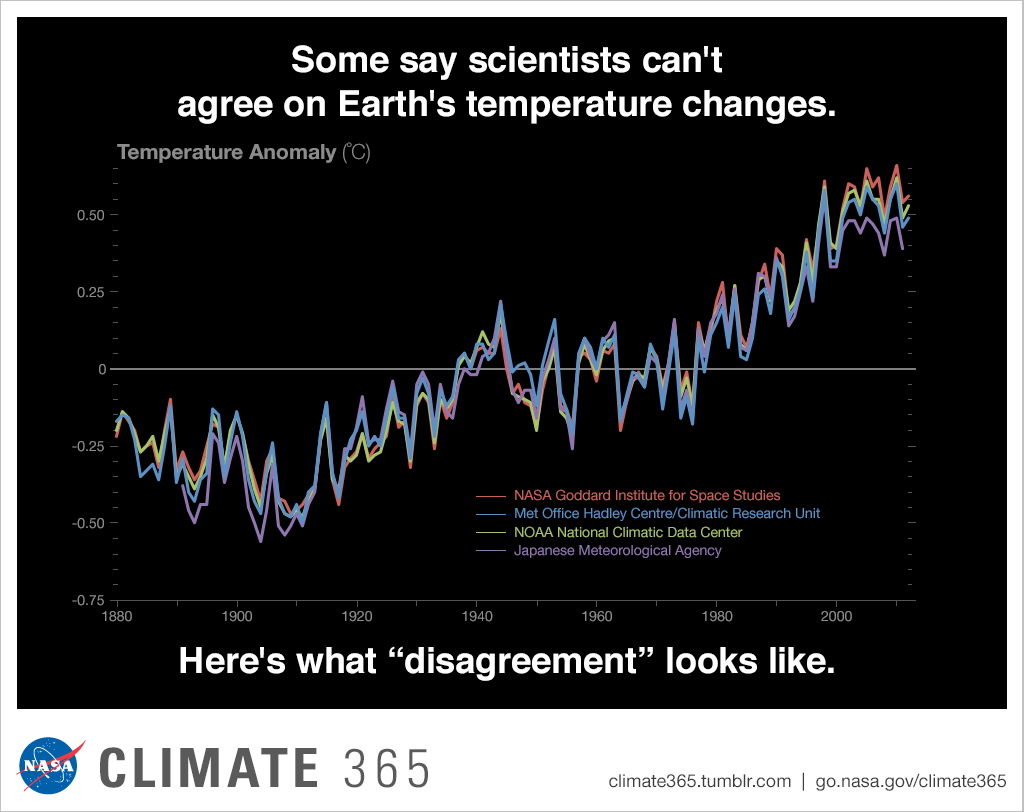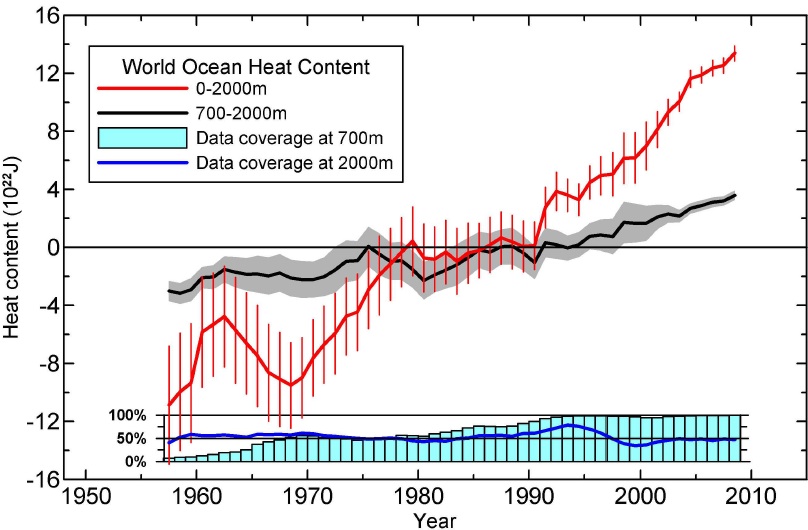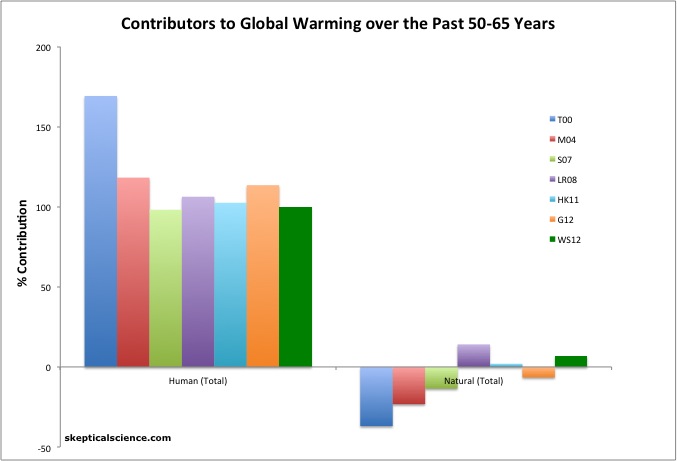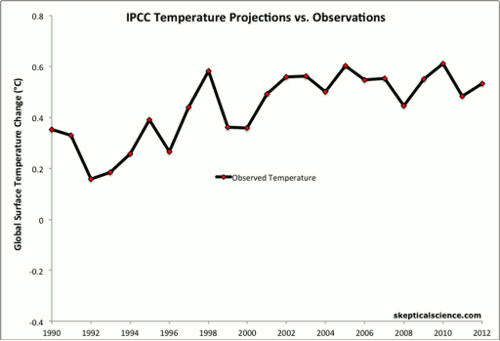NASA Retirees Appeal to their Own Lack of Climate Authority
Posted on 24 January 2013 by dana1981
In April of 2012, 49 former NASA employees sent a letter to the current NASA administrator requesting that he effectively muzzle the climate scientists at NASA Goddard Institute for Space Studies (GISS). None of those former NASA employees have conducted any climate science research, but based on their own lack of understanding of the subject, they objected to the conclusions drawn by the climate experts at NASA GISS. This letter drew media attention because folks who have worked at NASA are well-respected (and rightly so), but there was really no substance to it, or any particular reason to lend it credence. Astronauts and engineers are not climate experts.
Now in January of 2013, a group of 20 "Apollo era NASA retirees" has put together a rudimentary climate "report" and issued a press release declaring that they have decided human-caused global warming is not "settled" and is nothing to worry about. This time around they have not listed the 20 individuals who contributed to this project, but have simply described the group as being:
"...comprised of renowned space scientists with formal educational and decades career involvement in engineering, physics, chemistry, astrophysics, geophysics, geology and meteorology. Many of these scientists have Ph.Ds"
The project seems to be headed by H. Leighton Steward, a 77-year-old former oil and gas executive. The press release also links the NASA group to his website, "co2isgreen", which also has an extensive history of receiving fossil fuel industry funding.
This story can be summed up very simply: a group of retired NASA scientists with no climate science research experience listened to a few climate scientists and a few fossil fuel-funded contrarian scientists, read a few climate blogs, asked a few relatively simple questions, decided that those questions cannot be answered (though we will answer them in this post), put together a very rudimentary report, and now expect people to listen to them because they used to work at NASA. It's purely an appeal to authority, except that the participants have no authority or expertise in climate science.
Answering the NASA Retirees' Questions
Most of the group's report is devoted to summarizing some basic aspects of climate science, such as the greenhouse effect. At the end it lists seven "conclusions", most of which are questions they claim "are still to be resolved", but in reality are generally simple to answer.
1) How really well known is the global temperature of the earth over the past century?
Quite really well known. The accuracy of the surface temperature record has been confirmed by many different studies using a variety of different approaches, including by natural thermometers and satellites. There is very little difference between the results of different groups analyzing the surface temperature data (Figure 1).
Figure 1: The four main global surface temperature measurement datasets (Source)
Ocean measurements also show an immense amount of heat accumulation in the world's oceans, well outside the margin of error (Figure 2).
Figure 2: Time series for the World Ocean of ocean heat content (1022 J) for the 0-2000m (red) and 700-2000m (black) layers based on running pentadal (five-year) analyses. Reference period is 1955-2006. Each pentadal estimate is plotted at the midpoint of the 5-year period. The vertical bars represent +/- 2 times the standard error of the mean (S.E.) about the pentadal estimate for the 0-2000m estimates and the grey-shaded area represent +/- 2*S.E. about the pentadal estimate for the 700-2000m estimates. The blue bar chart at the bottom represents the percentage of one-degree squares (globally) that have at least four pentadal one-degree square anomaly values used in their computation at 700m depth. Blue line is the same as for the bar chart but for 2000m depth. From Levitus et al. (2012)
2) How important to the factors that determine the surface temperature of the earth are the human related increases of CO2?
Human greenhouse gas emissions are the dominant cause of global warming (Figure 3). The science is entirely settled on this question, which simply boils down to physics. Long-term global warming is caused by a global energy imbalance. Human greenhouse gas emissions are responsible for by far the largest such energy imbalance over the past century.
Figure 3: Net human and natural percent contributions to the observed global surface warming over the past 50-65 years according to Tett et al. 2000 (T00, dark blue), Meehl et al. 2004 (M04, red), Stone et al. 2007 (S07, light green), Lean and Rind 2008 (LR08, purple), Huber and Knutti 2011 (HK11, light blue), Gillett et al. 2012 (G12, orange), and Wigley and Santer 2012 (WS12, dark green).
3) What exactly are the true feedback effects and how do they vary?
There are a number of different climate feedbacks which amplify or dampen global warming. The NASA document accurately summarizes their net effect.
"The net effect, which includes feedbacks) on the temperature anomaly from the IPCC (AR4) was ... 2.0 - 4.5 K"
By itself, a doubling of atmospheric CO2 will cause an energy imbalance sufficient to ultimately warm global surface temperatures about 1.2°C. Through a variety of different types of studies, climate scientists have concluded that the net effect of the various temperature feedbacks will amplify that warming to somewhere in the range of 2 to 4.5°C in response to doubled CO2.
4) Since the 1988 Hansen paper and presentation to Congress, through the IPCC 2000 and subsequent projections of the global temperature anomaly, the models have consistently over-projected the actual measured temperature anomalies in the subsequent years.
This statement, derived from a blog post, is simply incorrect. As we at Skeptical Science have shown several times, the IPCC temperature projections have been exceptionally accurate (Figure 4).
Figure 4: IPCC temperature projections (red, pink, orange, green) and contrarian projections (blue and purple) vs. observed surface temperature changes (average of NASA GISS, NOAA NCDC, and HadCRUT4; black and red) for 1990 through 2012.
Conclusion 4 in the document also incorrectly states that "the IPCC projections are intended to represent the worst-case scenario." The IPCC projections are based on a wide variety of human greenhouse gas emissions scenarios, not simply a single worst-case scenario. Given that many climate variables are changing faster than the IPCC anticipated, it would make for a pretty terrible worst case scenario.
5) What accounts for some of the observed differences between the steady increase in CO2 concentrations over the last century and the more erratic changes in estimated global temperature anomaly?
Cooling from human aerosol emissions offset warming from human greenhouse gas emissions in the mid-20th century, and on top of that there is natural internal variability in the climate system, as Kevin C's video illustrates.
6) What are the relative effects of natural climate oscillations such as the El Nino Southern Oscillation, (ENSO), the Pacific Decadal Oscillation (PDO), and the Atlantic Multi-decadal Oscillation (AMO) on the earth’s temperature trends? Are they compensating for the radiative forcing of CO2 (and other GHG) increases?
These are some of the contributors to the short-term natural internal variability mentioned in the answer to the last question. No, natural variability is not 'compensating' for the radiative forcing (global energy imbalance) caused by greenhouse gases. Recent research by Sedlá?ek & Knutti (2012) found that warming caused by internal variability creates a very patchy pattern, whereas we observe a very smooth pattern of warming, consistent with an external forcing like an increased greenhouse effect. However, the ocean cycles mentioned in this question have caused a short-term dampening of global surface warming over the past decade or so.
7) Why is it assumed that, aside from the more obvious impacts of significant sea level rise on existing infrastructure, that the net effect of more CO2 is negative? After all, CO2 is often added to commercial greenhouses to promote plant growth
This is not an assumption, it is the result of a wide body of scientific research. More CO2 means more global warming, which means more climate change, which means more extreme weather, like more heat waves and droughts, which does not bode well for plant growth or for most other life on the planet. Species are already going extinct at a relatively rapid rate. And on top of climate change, there's the damage CO2 causes via ocean acidification, global warming's evil twin.
These are not difficult questions, in fact we have answered them all here on Skeptical Science.
Risk Management - Uncertainty is not Your Friend
After failing to do more than the most rudimentary climate research, the NASA retirees wrongly conclude that uncertainty can be used to justify inaction.
"Despite claims of consensus and other appeals to authority, no one knows these answers. Once politics is removed, the evidence so far (2011) is that the actual net effect is low or uncertain (considering multiple known and potential feedbacks). As such, aggressive and extraordinarily far-reaching steps by governments to reduce production of CO2 is not warranted."
This conclusion illustrates a risk management failure which is very common amongst climate contrarians. It's no different than saying "I don't think that I'll be in a car accident, so I won't purchase auto insurance." The average American has a 30% chance of being involved in a serious automobile accident in his or her lifetime, and the odds of very dangerous and damaging climate change are even higher if we continue on a business-as-usual path – in fact that is the most likely scenario.
Climate contrarians like these NASA retirees essentially believe that the best case scenario will occur, that the net climate feedback and sensitivity will be near the low end of the possible range, and that we will be able to cope with future climate change. That is a possibility, but the best case scenario is only one possible outcome, and thus represents a very low overall probability of occurring. And when we fail to prepare for or prevent the worst case scenario, or even the most probable scenario, bad things happen.
Appealing to Authority Requires Actually Having Authority
Ultimately the NASA Apollo-era retirees expect the public to defer to their opinions on climate change, despite the fact that they have failed to do more than the most basic climate research and do not understand the most fundamental aspects of risk management (which is rather strange, since Apollo 13 was a good lesson in preparing for the worst case scenario).
In reality many of the questions they believe nobody has answered are actually settled science. We know humans are causing global warming, we know there is also natural variability in the climate system, and we know the climate consequences will be bad if we continue on our present course. Just how bad is an open question, which depends in large part on how quickly we reduce our greenhouse gas emissions. However, these NASA retirees are asking us to delay action in the hopes that the best case scenario will occur. This is a total risk management failure, because if they are wrong and the best case does not come to fruition, we will face some nasty consequences, and there will be very little that we can do about it.
As with the last NASA retiree letter, there is no reason why we should pay heed to this document, and very good reasons why we should reject its conclusions. We are again left wishing that these retirees would leave the climate science to the real climate experts at NASA, who are some of the best in the world.































 Arguments
Arguments


































I will identify myself as the leader or Chairman of The Right Climate Stuff research team that published a one page summary of our findings (discussed above in this blog and comments) from a year long study of the question: Are human related CO2 emissions causing alarming warming of the planet that requires swift corrective action by our government?
I have two questions for the author or readers of this blog:
1. Can anyone define for any current specific location on earth, a temperature "Problem" stated in terms of a harmful deviation in temperature from the normal variation range at that location of the last 10,000 years of very stable climate on earth? What are the high confidence projected consequences of this problem or problems if no corrective action is taken? I'm not interested in global average temperature that seems to be a metric subject to anthropogenic mischief. I am trying to define one specific temperature problem for at least one location on earth that will help me be able to prove root cause of the problem.
2. Can anyone tell me what the critique published at SkepticalScience regarding my Powerpoint Presentation given at CPAC on March 15, 2013 said? I was encouraged by a well-known climate scientist to visit this blogsite to review and respond to it, but apparently that critique has been removed from this site? Why?
Harold, you're constructing a strawman. No one ever said that the average temperature increase for any given location was going to be the feature problem of the climate change associated with rapid global warming. You can look at, for example, Petoukhov et al. (2013) and Johanson & Fu (2009) and research on the Paleocene-Eocene Thermal Maximum, a decent analogue for the current situation (although we're warming much, much more rapidly than that extreme event).
Unless, of course, you're going to utter some nonsense about the greenhouse effect not existing.
Harold Doiron, you can start with the post that responds to the myth "It's Not Bad". Be sure to click the Intermediate and Advanced tabs for more details and links to the peer-reviewed scientific publications containing even more specifics. You might also check out the U.S. Department of Agriculture's reports.
Harold, thanks for visiting.
I can't answer your other questions, but here's a question for which I was unable to find an answer when your letter made the rounds earlier, despite my contacting some of the parties apparently involved in promoting your opinions. Who paid for the press campaign around your work? I see that your summary was mostly publicized via PR Newswire, which of course charges for service. Did you guys pass the hat amongst yourselves, or failing that who stepped forward to pay for your PR campaign?
Harold H Doiron "I am trying to define one specific temperature problem for at least one location on earth that will help me be able to prove root cause of the problem."
Simple question...
Why?
Harold, in the "It's Not Bad" post, be sure to click the links in the "Further Reading" green section below the post (but above the comments).
Harold
Depends how 'specifc' you want your location to be. So here are two examples for some moderately specific locations.
The Arctic. Rising temperatures there have resulted in melting of the permafrost beginning. This is causing erosion, land subsidence, damage to roads, destruction of pipes and buried infrstructure. It is also causing venting of elevated amounts of Methane. Future projections of impacts can be based on known studies of permafrost distribution and temperature profiles overlaid by patterns of human infrastructure. The Russians have identified several entire cities at risk from these problems. Also potential risks to major Natural Gas supply pipelines.
Next, 'dead zones; in the ocean. It is basic chemistry that warmer water cannot hold as much gas in solution. This matters particularly for oxygen. Colder waters are better oxygenated which is why the most productive parts of the oceans are mainly in the higher latitudes. The clear waters of the Tropics are so clear because there is much less microscopic life within them - biologically the tropical oceans are like deserts with coral reefs being like little oases. In the extreme, there are regions where there is virtually no life - oceanographers have colloquially labelled these regions 'dead zones'. These can be found for example in the Gulf of Mexico. With higher water temperatures, oxygenation will decline and such dead zones will expand. Generally, warmer oceans will be less biologically productive. Since the oceans are the primary source of protein for around a billion people, any decline in the biological productivity of the oceans must unavoidably lead to a reduction in available protein.
Declining oceanic productivity due to reduced oxygenation is something that biologists could predict with high confidence since the chemistry of Henry's Law is well understood, as are the relationships between biological productivity and oxygenation levels.
Also Harold, a general class of problem one could study.
Take any agricultural region and look at which of the major grain crops are grown there and what the average climate is at that location. Then apply the various studies that have been done into how much yields for those crops vary with temperature. Apply different possible warming scenarios to that location, factor in that locations current climate and the temperature/yield data and estimate how much yields from crops at that location are likely to vary due to the warming in diffferent scenarios.
Then one would need to repeat such studies for many locations in order to integrate the results. In some locations this may be positive, in others negative. The common conclusion from the Biological Science community that has looked into this is that the projected climate change is more likely to be a net negative for larger levels of warming.
Critically, given the importance of sustained crop yields to food security, this needs to be considered as a probabalistic risk assessment, with appropriate weightings given to different possible outcomes based on what the severity of particular consequence might be.
Crop yeld changes due to temperature alone is only one possible impact of a changing climate at each location; precipitation changes, variations in the proportion of more extreme weather events occuring, changes in the timing of the growing season, changes in the timing of the life cycles of the crop plants relative to that of associated, necessary other species such as polinators are also potential impacts.
Harold, the major problem is the rate of change of temperature and the resulting other climatic effects (precipitation, sea level, sea chemistry, snow and ice cover, etc.). For example, nearly every dang land-living plant and animal (and some water-living ones) that people eat nowadays has been bred over decades to millenia to suit the current particular conditions of growing, harvesting, marketing, preparing, and eating. Changing those conditions makes those plants and animals less suitable. Re-breeding those plants and animals to suit the new conditions will take lots of time and money, during which time the producers and consumers of those products will suffer (in some cases starve to death). Production of the existing breeds cannot simply be moved to new locations that now have the desired conditions, because those locations already are being used for other things.
For example, some of my friends have a 20,000 acre cattle ranch. Their success depends on lots of climate factors, including not just how much it rains in a year (to make the grass grow), but also the precise timing of the rain in order to have the cattle fattened at the right time for market and even for the cattle's survival. If the rain total or timing change so that their ranch now is unproductive but the north-neighboring land's conditions now are suitable, my friends can move their ranch there only if they buy out the entire town that happens to occupy that land, level the town, haul out the resulting rubble, and plant grass everywhere. That's not feasible in the span of just a decade or two.
If instead that same change were spread out over 10,000 years, the compensating transitions would be inconsequential. My friends and many generations of their descendants would be long gone. The neighboring town might well have disappeared, rotted away, and turned into grassland anyway, making it available for someone else to ranch it.
Before you reply that we must just bite the bullet and pay the cost of accomodating the change to the new climate, stop to realize that there won't be any "the" new climate. As long as humans keep dumping CO2 into the atmosphere, the climate will keep changing. The target we try to accomodate toward will keep moving constantly. It is stupid for us to consciously accelerate the motion of that target.
Well I hope Harold's not going to pull a Tom Harris and mumble some non sequitur response followed by a general disappearance. In the interest of encouraging Harold's interaction, I suggest we avoid dogpiling.
Harold - whoever you spoke to was mistaken. We have not even seen your CPAC presentation. From what I read, Walter Cunningham's and Thomas Wysmuller's comments were kind of a joke, apparently denying that the planet is warming.
From the same story, you said sea level rise isn't a global problem (which is kind of silly – a whole lot of countries, including the USA, have coastal property), and said China is refusing to address climate change, which is wrong. Other than that, I don't know what was included in your presenation, so we haven't addressed it.